Plain Jane
Just Plain Jane
November's thread:
 www.timebomb2000.com
www.timebomb2000.com
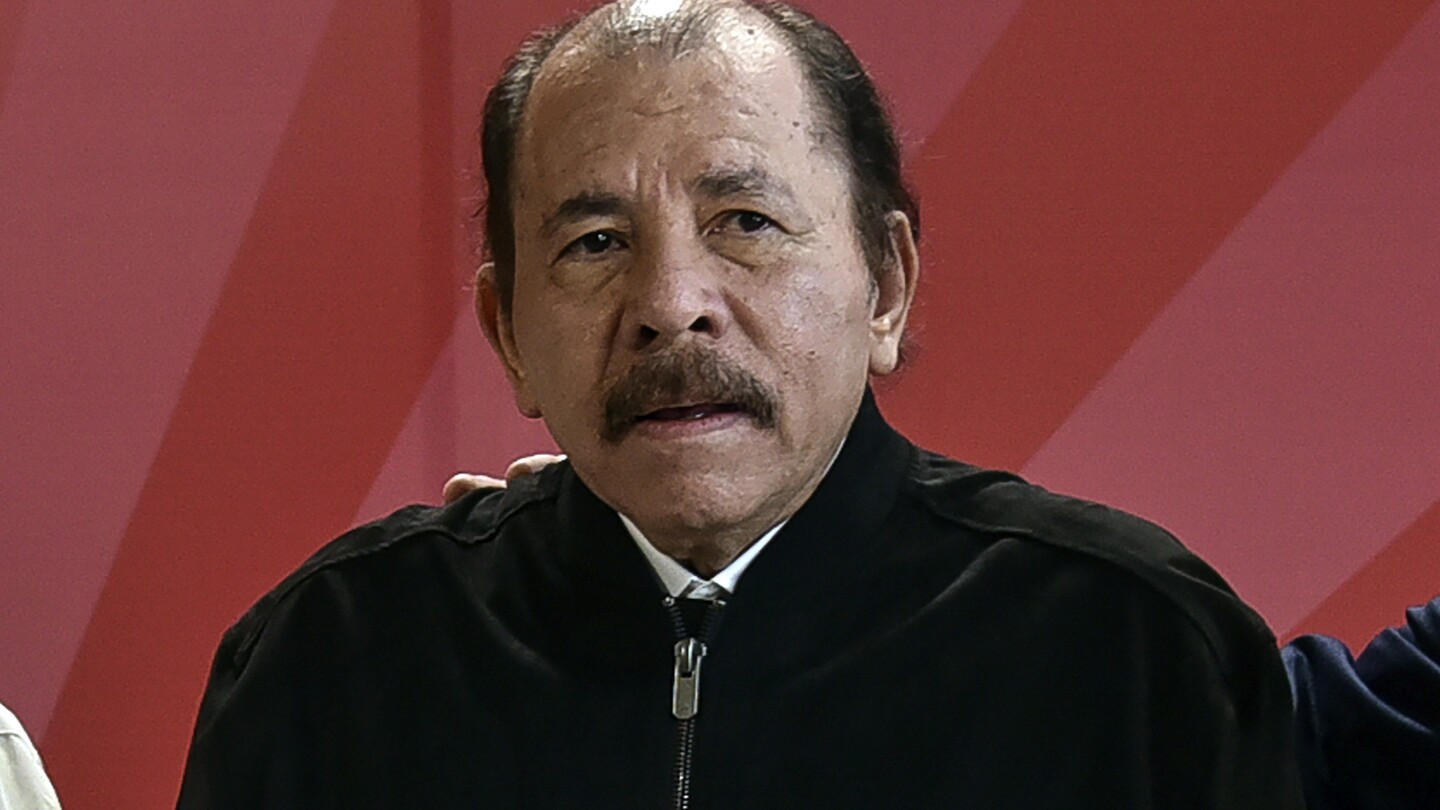
 apnews.com
apnews.com

FILE - Nicaragua’s President Daniel Ortega poses for a photo during the ALBA Summit at the Palace of the Revolution in Havana, Cuba, Tuesday, Dec. 14, 2021. A new study released Wednesday, Nov. 29, 2023 says that about half of Nicaragua’s population of 6.2 million want to leave their homeland because of a mix of economic decline and repression from President Daniel Ortega’s government. The study said that 23% considered themselves “very prepared” to emigrate. (Adalberto Roque, Pool Photo via AP, file)
Read More
BY GABRIELA SELSER
Updated 4:44 PM EST, November 30, 2023
Share
MEXICO CITY (AP) — Lawyer Isabel Lazo’s jobs are being systematically canceled by Nicaragua’s increasingly repressive government.
Lazo worked at a university before the government of President Daniel Ortega closed it. She now is employed at a nongovernmental organization that she fears will soon be shuttered too.
Nicaragua’s poisonous mix of economic decline and repression has led to about half of the country’s population of 6.2 million saying they want to leave their homeland, according to a new study, and 23% saying they had contemplated the possibility deeply enough to consider themselves “very prepared” to emigrate.
“A large proportion of them have already taken concrete steps to try to get out,” said Elizabeth Zechmeister, the director of the AmericasBarometer study “The Pulse of Democracy in the Americas.”
The study, which was released on Wednesday, shows that the number of Nicaraguans wanting to leave rose from 35% five years ago to almost half today, and that about 32% of people in 26 Latin American countries surveyed say they want to migrate.
Lazo, 42, and her husband Guillermo Lazo, 52, a systems engineer, both taught at the University of Northern Nicaragua until the Ortega government shut it down in April. It was one of 26 universities that closed because Ortega accused them of being centers of revolt, or failing to register or pay special taxes to the government, which has feuded with the Roman Catholic church, as well.
The couple lives in the northern city of Somoto, where Isabel Lazo now works for a European-backed NGO. Ortega’s government has outlawed or closed more than 3,000 civic groups and NGOs.
In May, the government ordered the Nicaraguan Red Cross shut down, accusing it of “attacks on peace and stability” during anti-government demonstrations in 2018. The local Red Cross says it just helped treat injured protesters.
Lazo said Thursday she is worried that it’s only a matter of time for the group where she now works.
“This will be ending soon,” she said dispiritedly, The couple is now awaiting a decision on a U.S. application for “humanitarian parole,” a program under which up to 30,000 people are being allowed each month to enter the U.S. from Cuba, Haiti, Nicaragua and Venezuela.
Until then, there are few prospects for them, even though they are among Nicaragua’s educated elite.
“We were left without jobs from one day to the next,” Lazo said. “And even though we have graduate degrees and master’s degrees, we haven’t found decent jobs. You can kill yourself studying here and it’s worth nothing.”
Thousands have already fled into exile since Nicaraguan security forces violently put down mass anti-government protests in 2018. Ortega says the protests were an attempted coup with foreign backing, aiming for his overthrow.
Rosemary Miranda is another educated Nicaraguan who wants to leave. A psychologist, she graduated from the Jesuit-run University of Central America, also closed and confiscated by the government.
Miranda, 24, works for a microfinancing firm at an office in Managua, the capital, but the $402 per month she earns there doesn’t even cover the cost of commuting, meals and clothing.
“In this country, the majority of people work just to eat. They can’t buy clothing or shoes without waiting a month between purchases,” Miranda said.
She has wanted to emigrate for some time, but she helps her family by giving them some of what little money she earns. With the purchasing power of wages falling, she is now rethinking her decision to stay.
“The situation here is very difficult. Every month the price of food, electricity, water and transportation rises,” she said. “What have I gotten in return for studying so much and graduating?”
INTL - Latin America and the Islands: Politics, Economics, Military - November 2024
October's thread: https://www.timebomb2000.com/xf/index.php?threads/latin-america-and-the-islands-politics-economics-military-october-2023.638618/#post-9925556 https://www.zerohedge.com/markets/not-crisis-its-invasion-massive-migrant-caravan-prepares-storm-us-border Not A Crisis. It's An...
A new study says about half of Nicaragua's population wants to emigrate
A new study says that about half of Nicaragua's population of 6.2 million want to leave their homeland because of a mix of economic decline and repression from President Daniel Ortega's government.
A new study says about half of Nicaragua’s population wants to emigrate
FILE - Nicaragua’s President Daniel Ortega poses for a photo during the ALBA Summit at the Palace of the Revolution in Havana, Cuba, Tuesday, Dec. 14, 2021. A new study released Wednesday, Nov. 29, 2023 says that about half of Nicaragua’s population of 6.2 million want to leave their homeland because of a mix of economic decline and repression from President Daniel Ortega’s government. The study said that 23% considered themselves “very prepared” to emigrate. (Adalberto Roque, Pool Photo via AP, file)
Read More
BY GABRIELA SELSER
Updated 4:44 PM EST, November 30, 2023
Share
MEXICO CITY (AP) — Lawyer Isabel Lazo’s jobs are being systematically canceled by Nicaragua’s increasingly repressive government.
Lazo worked at a university before the government of President Daniel Ortega closed it. She now is employed at a nongovernmental organization that she fears will soon be shuttered too.
Nicaragua’s poisonous mix of economic decline and repression has led to about half of the country’s population of 6.2 million saying they want to leave their homeland, according to a new study, and 23% saying they had contemplated the possibility deeply enough to consider themselves “very prepared” to emigrate.
“A large proportion of them have already taken concrete steps to try to get out,” said Elizabeth Zechmeister, the director of the AmericasBarometer study “The Pulse of Democracy in the Americas.”
The study, which was released on Wednesday, shows that the number of Nicaraguans wanting to leave rose from 35% five years ago to almost half today, and that about 32% of people in 26 Latin American countries surveyed say they want to migrate.
Lazo, 42, and her husband Guillermo Lazo, 52, a systems engineer, both taught at the University of Northern Nicaragua until the Ortega government shut it down in April. It was one of 26 universities that closed because Ortega accused them of being centers of revolt, or failing to register or pay special taxes to the government, which has feuded with the Roman Catholic church, as well.
The couple lives in the northern city of Somoto, where Isabel Lazo now works for a European-backed NGO. Ortega’s government has outlawed or closed more than 3,000 civic groups and NGOs.
In May, the government ordered the Nicaraguan Red Cross shut down, accusing it of “attacks on peace and stability” during anti-government demonstrations in 2018. The local Red Cross says it just helped treat injured protesters.
Lazo said Thursday she is worried that it’s only a matter of time for the group where she now works.
“This will be ending soon,” she said dispiritedly, The couple is now awaiting a decision on a U.S. application for “humanitarian parole,” a program under which up to 30,000 people are being allowed each month to enter the U.S. from Cuba, Haiti, Nicaragua and Venezuela.
Until then, there are few prospects for them, even though they are among Nicaragua’s educated elite.
“We were left without jobs from one day to the next,” Lazo said. “And even though we have graduate degrees and master’s degrees, we haven’t found decent jobs. You can kill yourself studying here and it’s worth nothing.”
Thousands have already fled into exile since Nicaraguan security forces violently put down mass anti-government protests in 2018. Ortega says the protests were an attempted coup with foreign backing, aiming for his overthrow.
Rosemary Miranda is another educated Nicaraguan who wants to leave. A psychologist, she graduated from the Jesuit-run University of Central America, also closed and confiscated by the government.
Miranda, 24, works for a microfinancing firm at an office in Managua, the capital, but the $402 per month she earns there doesn’t even cover the cost of commuting, meals and clothing.
“In this country, the majority of people work just to eat. They can’t buy clothing or shoes without waiting a month between purchases,” Miranda said.
She has wanted to emigrate for some time, but she helps her family by giving them some of what little money she earns. With the purchasing power of wages falling, she is now rethinking her decision to stay.
“The situation here is very difficult. Every month the price of food, electricity, water and transportation rises,” she said. “What have I gotten in return for studying so much and graduating?”

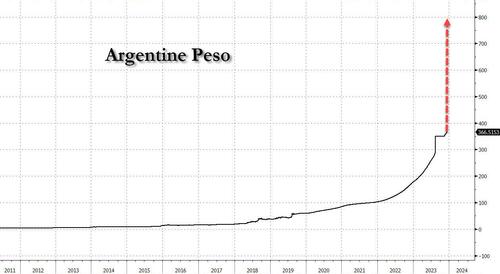
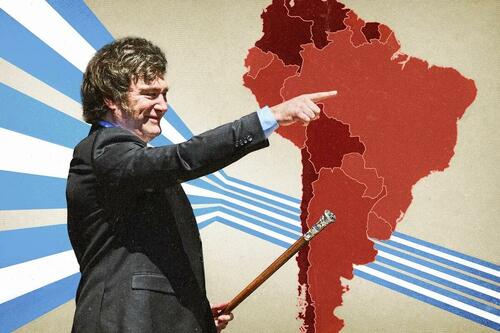 (Illustration by The Epoch Times, Getty Images, Freepik, Shutterstock)
(Illustration by The Epoch Times, Getty Images, Freepik, Shutterstock)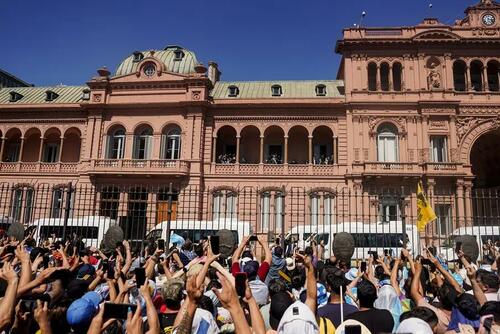 Argentina's newly sworn-in President Javier Milei addresses supporters from the balcony of the government house in Buenos Aires, Argentina, on Dec. 10, 2023. (Matilde Campodonico/AP Photo)
Argentina's newly sworn-in President Javier Milei addresses supporters from the balcony of the government house in Buenos Aires, Argentina, on Dec. 10, 2023. (Matilde Campodonico/AP Photo)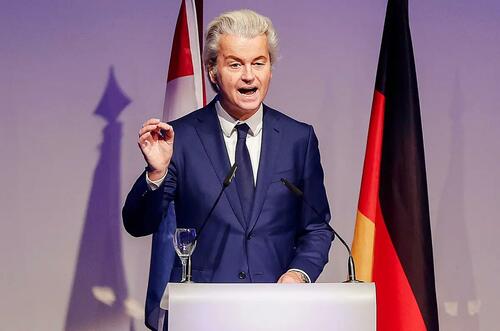 Dutch politician Geert Wilders delivers a speech at a meeting of European nationalists in Koblenz, Germany, on Jan. 21, 2017. (Michael Probst/AP Photo, File)
Dutch politician Geert Wilders delivers a speech at a meeting of European nationalists in Koblenz, Germany, on Jan. 21, 2017. (Michael Probst/AP Photo, File)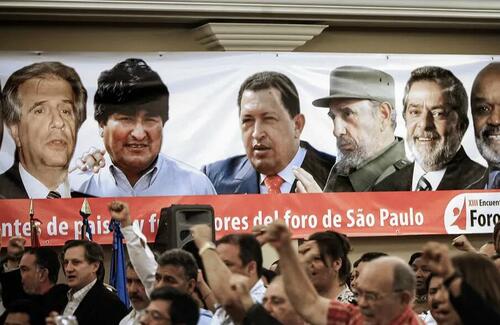 Attendees shout slogans during the opening of the Sao Paulo Forum, next to a banner with portraits of Latin American leftist presidents, in San Salvador, El Salvador, on Jan. 12, 2007. (Yuri Cortez/AFP via Getty Images)
Attendees shout slogans during the opening of the Sao Paulo Forum, next to a banner with portraits of Latin American leftist presidents, in San Salvador, El Salvador, on Jan. 12, 2007. (Yuri Cortez/AFP via Getty Images) The pair of former Green Berets was captured in May 2020 along with six Venezuelan nationals in a boat carrying weapons off the coast.
The pair of former Green Berets was captured in May 2020 along with six Venezuelan nationals in a boat carrying weapons off the coast.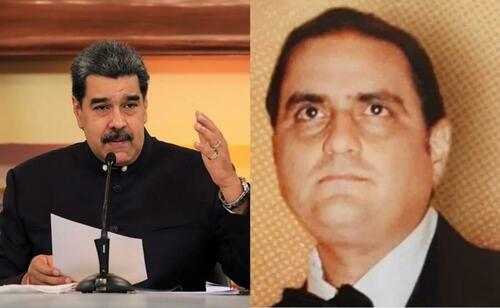 Maduro and Alex Saab, right.
Maduro and Alex Saab, right.